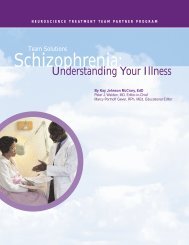Schizophrenia: Coping With Symptoms and Side Effects
Schizophrenia: Coping With Symptoms and Side Effects
Schizophrenia: Coping With Symptoms and Side Effects
Create successful ePaper yourself
Turn your PDF publications into a flip-book with our unique Google optimized e-Paper software.
Team Solutions | Workbook 9 <strong>Schizophrenia</strong>: <strong>Coping</strong> <strong>With</strong> <strong>Symptoms</strong> <strong>and</strong> <strong>Side</strong> <strong>Effects</strong><br />
Sexual difficulties<br />
Some people may have less sexual desire <strong>and</strong> fewer orgasms. Some men<br />
may have difficulty with erections or ejaculation. Many of these problems<br />
may be caused by side effects of antipsychotic medicines. However, lack of<br />
sexual desire could also be a symptom of schizophrenia.<br />
If you are having sexual difficulties, it’s important to talk with your doctor.<br />
Your doctor may be able to tell you if the problem is being caused by your<br />
medicine or your illness. If it is caused by your illness, the problem may<br />
improve as you continue with your treatment. If it’s your medicine that’s<br />
causing the problem, your doctor may want to adjust your dosage or<br />
change your medicine. Do not make any changes on your own—work<br />
with your doctor to find the treatment that works best for you.<br />
Sleep problems<br />
Not being able to sleep at night, or sleeping all day, may be an early warning<br />
symptom of relapse. If you’ve had two sleepless nights in a row, speak with<br />
your doctor or a member of your treatment team right away. If you are<br />
starting to relapse, you’ll be able to take action to stop the relapse before<br />
you become very ill.<br />
You may want to use some of the techniques below to help you sleep better:<br />
• Go to sleep <strong>and</strong> get up at about the same time every day, even if you had<br />
trouble sleeping<br />
• Get enough exercise during the day so that you’ll feel more tired at night<br />
• Avoid foods <strong>and</strong> beverages that contain caffeine<br />
• Take a warm shower or bath—you may feel more relaxed afterwards <strong>and</strong><br />
fall asleep more easily<br />
• Do some reading in bed just before going to sleep—many people say<br />
that reading relaxes them<br />
• Listen to soothing music as you’re trying to fall asleep<br />
You may also be able to improve your sleep by following a daily routine—<br />
wake up, eat your meals, exercise, <strong>and</strong> go to sleep at about the same times<br />
each day.<br />
20




